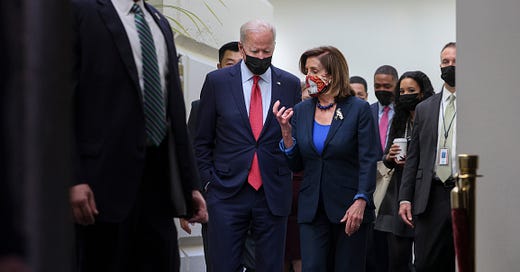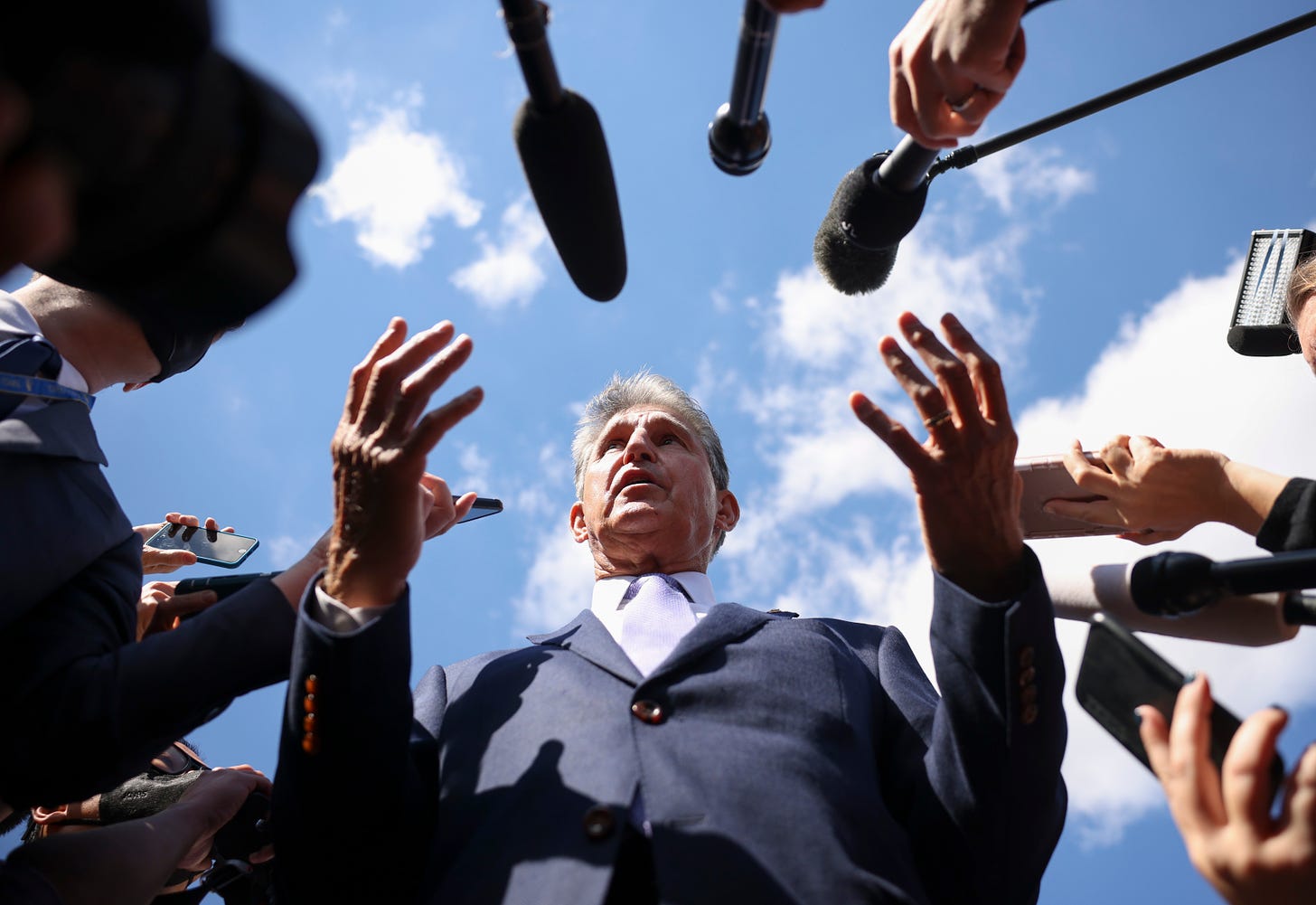Perhaps you have surmised from the question that titles this piece - Are the Democrats Really Divided? - that I might offer an answer of “no,” that the Democrats are not, at least by some definition of the word, “divided.” And that is indeed the case I will make, albeit with a lot of context and room for uncertainty (these are the Democrats, this is politics, and it is the real world, after all). But before I get there, let’s start with a bit of a scene setting.
There is a lot about what is going on that should make Democrats very nervous.
First and foremost, of course, is a Republican Party slavishly devoted to a cult of personality that has them embracing, largely en masse, authoritarian, anti-democratic, Big Lie, anti-science, and often xenophobic and even racist policies and rhetoric.
We have a Supreme Court (and many lower courts) stacked with right-wing true believers who burn precedent (and a sense of justice) with glee as they chart a path that seems to be to the right of Attila the Hun.
The Republicans have powerful megaphones on television and social media amplifying the disinformation and outright lies by which they rally their base.
President Biden’s approval ratings have sunk quite low, portending powerful headwinds going into the midterm elections in which the Democrats will try to keep their razor-thin margins in both houses of Congress. And we all know that history says that the president’s party tends to lose, and often lose big, in these off-year elections.
Then there is the pandemic, fanned by those who see common-sense public health measures as attacks on their freedom, the assault on a woman’s rights to control over her own body, the increasingly uncertain and dangerous climate, the undermining of voting rights, and… well, as you know, I could go on and on.
Against all of this, the country has been subjected this past week to the invariable making of political sausage. And just like the making of real sausage, it ain’t pretty. The focus has been on the disagreements, particularly with two senators, West Virginia’s Joe Manchin, and Arizona’s Krysten Sinema. There have also been a few hold outs in the House, who place themselves under the banner of “moderates,” and who have garnered a lot of headlines as they complicate the task for Speaker Nancy Pelosi.
As I write this, the fate of President Biden’s two signature pieces of legislation, with which he hopes to profoundly remake the direction of American society, remains unknown. And for the purposes of this note, I won’t delve into the details of what the final bills might contain and at what scale, in large part because we don’t know. Regardless, if Pelosi, Schumer, and Biden can get these across the finish line, the legislation will be a transformative achievement that rivals anything accomplished in Washington in decades. At the same time, it will almost assuredly be less than what most Democrats - be they elected officials or average voters, in Washington or across the country - actually want.
And that is the point I am trying to make. The vast majority of Democrats actually agree on what should happen. And not just on these bills, but when it comes to even steps like abolishing the filibuster in the Senate. The reason why we are getting all these stories about a party in chaos, the reason why this legislation and other initiatives are in peril, is not because there are huge factions within the party at war. It is because the Democrats don’t have a lot of votes to spare. I suspect if there were 53 or 54 Democratic senators, and they had 10 more House members, we would be having a very different conversation. Even so, in the House, Pelosi exposed the impotence of those creating panic and President Biden brought down the hammer by siding with the progressives in linking the fate of the infrastructure bill and his broader economic package that must be passed through reconciliation. And in the Senate, the caucus of no is really a caucus of two.
As someone who has covered Washington since almost the time of its namesake, I think that a lot of the political reporting has been a bit distorted. It is true that there has been a mad scramble in both chambers to try to rescue these proposals. And yes the process has been ugly. And yes it is defined by division. But it’s less like a family feud and more like that one uncle at Thanksgiving who just won’t stop being annoying and you have no choice but to figure out how you’re going to deal with him. It is going to diminish the enjoyment of the holiday, but that doesn’t mean you still can’t have a good time.
And that’s I think where the Democrats find themselves today. They could have gotten more, but they still might end up getting a lot.
On the broader scale, however, I believe the Trump years obscured another political story. So much of the coverage was rightfully about the opposition that a lot was missed around the coalescing. The Democrats have come together, almost at all levels of elected office and across the country, in agreement about certain needs, investing in social safety nets for the future, fighting climate change, reckoning with racial injustice, pushing for LGBTQ rights, and a whole host of other issues. That isn’t to say there is no disagreement, especially around tactics and scale. But it’s really remarkable how much of a progressive mindset, even extending to such things as abolishing the filibuster and maybe soon reforming the courts, is becoming mainstream party orthodoxy.
What is a much bigger question is whether this vision will win out in the nation at large. Here there are a lot of mixed signals. The Democrats have won the popular vote for president in every election save one since 1988. The polling for Democratic priorities is often high. But the structural advantages Republicans have in our political system remain strong. Disinformation is a powerful weapon. And the Democrats often have trouble getting their voters out in non-presidential elections.
We often talk here about the perils facing democracy. And they are very real, and growing stronger. At the same time there is a different vision for America that is uniting almost the entirety of the Democratic Party. It is much more progressive and more built on action than anything I have seen in a long time. It probably is supported by a majority of the country. It’s just not clear if that will be enough. But it might be.






This article hits on ever important issue we are dealing with today, except one. The media has become the coach for the battle. Constantly egging on each side to win at all costs. Pitting each side against the other. Making drama were none exists.
What is happening within the Democratic party is how elected officials come to agreement, give and take. The Republican party has decided to no longer participate in governing they just want to pull it all down. The media wants to write or report stuff real or fake as long as they get their share.
One other thing: for a long time now, the media, rather than reporting the news, drives the news by what they report and how they frame it. Both, or all, sides. Perhaps it has always been so, but I don't think so.